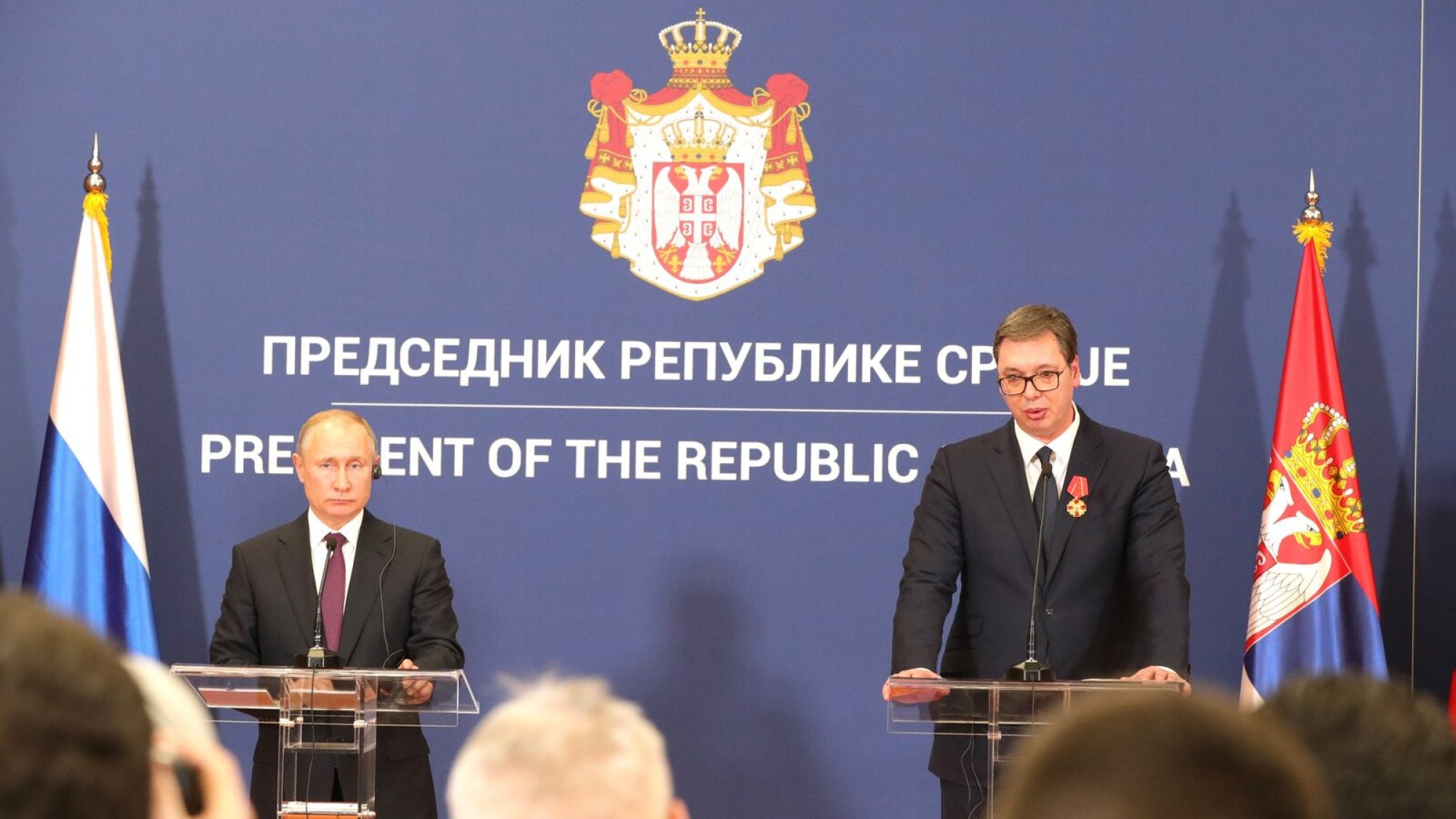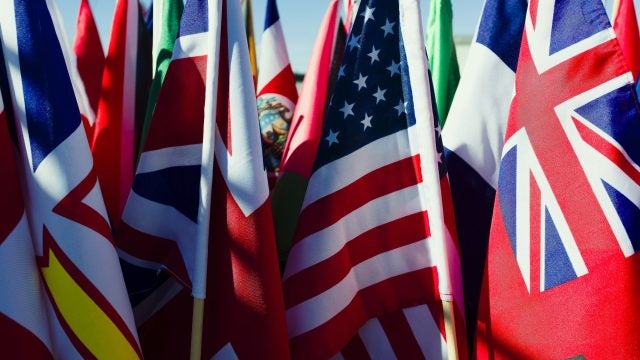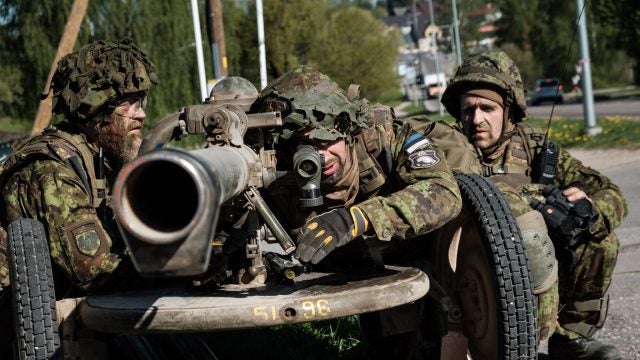
Title: Serbia’s Staged Balancing Act
In 2022, with Russian aggression against Ukraine, Serbia drew international scrutiny for not supporting EU sanctions against Russia and its foreign policy regarding the Russia-Ukraine War. Rather than being squeezed between East and West, Serbia under Aleksandar Vučić pursues ambiguity to secure power domestically and maximize maneuvering space internationally.
At the beginning of March 2022, when demonstrations against Russian aggression in Ukraine broke out across Europe, several thousand demonstrators gathered in Belgrade to support Russia. The demonstrators moved from the monument of Tsar Nikola II to the Russian and Belarusian embassies. In addition to the slogan “Serbia and Russia do not need the [European] Union,” the demonstrators displayed the letter “Z” (the symbol of the Russian invasion), Orthodox icons, and Serbian and Russian flags. The demonstrators also criticized the Serbian government, accusing it of treason for insufficient support to Russia–despite Serbia’s opposition to sanctions against Russia. In the coming months, small far-right groups organized numerous protests. Putin has been the most popular international politician in Serbia even after the start of the Ukrainian War. 84.8 percent of Serbs also blame NATO for the war in Ukraine. Despite these pro-Russia views, most Serbs do not want complete alignment with Russia. Rather, they prefer to keep a distance from both the West (the European Union and the United States) and Russia.
Serbia Squeezed between Russia and the West?
Under Vučić, Serbia has sought to maintain friendly relations with both Russia and the West since the beginning of Russian aggression against Ukraine. Serbia’s contradictory foreign policy has involved condemning Russian aggression and selling weapons to Ukraine while not imposing sanctions against Russia. Since the outbreak of the war, Serbia’s president and government have repeatedly claimed that they are beset by both East and West. For example, in August 2022, responding to a demonstration against Europride, Vučić told Reuters that he believed that a proxy conflict between the East and the West was taking place in Serbia. Various media outlets also readily adopted this narrative. Depending on the situation, Vučić presents himself as a victim of the great powers or a skillful juggler on the world stage to secure power. Vučić could have used Russian aggression against Ukraine to distance himself from Russia: ultimately, Russian aggression threatens Ukrainian sovereignty just as Kosovo’s independence supposedly threatens Serbia’s sovereignty. The Serbian government, however, maintains a deliberate ambivalence, maintaining amicable relations with Russia while also condemning attacks on Ukraine’s territorial integrity.
To the surprise of many, Serbia joined in condemning Russia at the United Nations General Assembly on March 2, 2022. In April 2022, Serbia again supported a vote to suspend Russia in the United Nations Human Rights Council. Far-right groups accused the Serbian government of “treason” after this vote. Further tensions emerged when media reports suggested Serbia delivered weapons to Ukraine. These weapon deliveries were confirmed in the US intelligence materials uncovered in April 2023.
Despite these tensions with Russia, the Serbian government did not support any of the sanctions imposed by the EU, the United States, or the United Kingdom, citing its historical sufferings from sanctions. In addition, Serbia’s dependence on Russian energy, especially gas, meant that Serbia could not risk joining Western powers by imposing sanctions.
The apparent divergence between Serbian and EU foreign policies existed long before Russia’s war of aggression against Ukraine. Serbia has maintained good relations with Russia and China since the late 2000s. After Kosovo became independent, Serbian President Boris Tadić announced in 2009 that Serbia’s foreign policy was based on four pillars: good relations with the EU, the United States, China, and Russia. Aleksandar Vučić has perfected this foreign policy ambivalence.
Serbia’s geopolitical ambivalence is not only a part of the regime’s foreign policy but also deeply embedded domestically. Government-controlled media have deliberately promoted anti-Western attitudes since Vučić came to power. Russia and China as well as their presidents, Vladimir Putin and Xi Jinping, appear in an overwhelmingly positive light. Furthermore, the media stages a constant threat against Serbia: the tabloids have warned almost daily of an imminent war against Serbia—pointing fingers towards either neighboring states or the West—for years. This distorted portrayal of reality presents Serbia and its people as victims of global and regional conspiracies. In such a media landscape directed by Vučić and the ruling party, the tabloid Informer claimed “Ukraine is attacking Russia” a few days before the war began. As the war began, the media became somewhat more restrained in supporting Russia, but a positive image of Russia and President Putin prevailed.
The Purposes of Serbia’s Political Ambivalence
Despite the opportunity to realign with the EU and NATO at the beginning of the Russian aggression in early 2022, Serbia under Vučić preserved its geopolitical ambivalence. At first glance, this ambivalence between East and West seems to place Serbia in a difficult position, especially as tensions between Russia and the West have increased. Yet, this ambivalence grew from Vučić’s attempt to secure leeway in his domestic and foreign policy. Vučić has maintained good relations with Russia because of Serbia’s need for Russian gas and support regarding Kosovo. Vučić’s foreign policy ambivalence also has domestic political rooting, as many Serbs, albeit mistakenly, see Russia as a historical friend. This allows the president and his party to secure broad popular support, as the relationship with Putin enhances Vučić’s image as a powerful statesman and protects his government from criticism by nationalist opposition parties.
Vučić’s ambivalent foreign policy also helps Vučić maintain support from the West, especially after the Russian attack on Ukraine. The West seeks to prevent Serbia’s complete alignment with Russia and China. Serbia has not faced serious pressure since the beginning of the war to impose sanctions on Russia. Instead, Serbia received its largest single EU grant to reconstruct the train line between Belgrade and its third largest city, Niš, in early 2023. In addition, during EU and US-led talks between Serbia and Kosovo, Serbian positions received significantly more support than before the Russian invasion of Ukraine. Therefore, ambivalence is a sustainable position for Serbia despite the general antagonism between East and West.
This tightrope act is not a dilemma into which Vučić has fallen by chance, but rather a central pillar of his rule. As a result, Serbia is likely to maintain this ambiguity as long as Vučić is in power. Even if Russia were to decline as a relevant actor for Serbia, Vučić would likely rely on China as a counterweight to Western influence.
Policy Recommendations
Serbia’s policy of ambivalence is not beneficial for Serbia, the EU, or the United States. Vučić uses it to carve out more executive independence, undermining democracy and the rule of law in Serbia. It allows Vučić to control the media and promote anti-Western messages in Serbia and among Serbs in neighboring countries. Such antagonism threatens stability in the Balkans and the region’s long-term relations with the EU. Nationalist and pro-Russian parties would not only turn their back on EU integration and fledgling democracies but also promote revisionist nationalism. This would lead to Russia channeling its influence through an increasingly authoritarian Serbia, augmenting global polarization.
Currently, the West has sought to prevent complete Serbian alignment with the East. However, this approach is grounded on the misunderstanding that Serbia is controlled by opposing global actors. However, in reality, the Serbian government has invited Russian and Chinese influence, as these countries have little direct leverage over Serbia.
Reversing this worrying trend requires invigorating civil society in Serbia to exert greater pressure on the government to ensure media independence, in particular regarding the licensing process of electronic media. The West should also use its economic leverage more effectively to bring Serbia into its orbit. The EU can also highlight existing projects and partnerships to show that the EU remains a more important partner than China or Russia. The EU can also tie substantial funds to clear improvements in human rights and domestic governance conditions in Serbia. The main problem in Serbia is not its geopolitical ambiguity but rather its authoritarian regime that fosters anti-Western sentiment. Thus, actively counteracting authoritarianism in Serbia should be a priority for the Western powers. This will require long-term efforts in uniting a currently weak and divided opposition in Serbia.
. . .
Florian Bieber is a Professor of Southeast European History and Politics and Director of the Centre for Southeast European Studies at the University of Graz, Austria. He is the coordinator of the Balkans in Europe Policy Advisory Group (BiEPAG). His recent publications include Debating Nationalism (Bloomsbury 2020) and The Rise of Authoritarianism in the Western Balkans (Palgrave 2020).
Image Credits: Wikimedia
Recommended Articles

On May 20, 2025, the World Health Assembly unanimously adopted the World Health Organization (WHO) Pandemic Agreement, an international treaty designed to strengthen pandemic prevention, preparedness, and…

As the Trump administration proposes a sweeping overhaul of the US foreign assistance architecture by dismantling USAID, the Millennium Challenge Corporation (MCC), and restructuring the State Department, there is an…

The Trump administration’s abandonment of allies and embrace of Putin’s Russia has raised pressing questions about whether Estonia, Latvia, and Lithuania can continue to rely on NATO for…